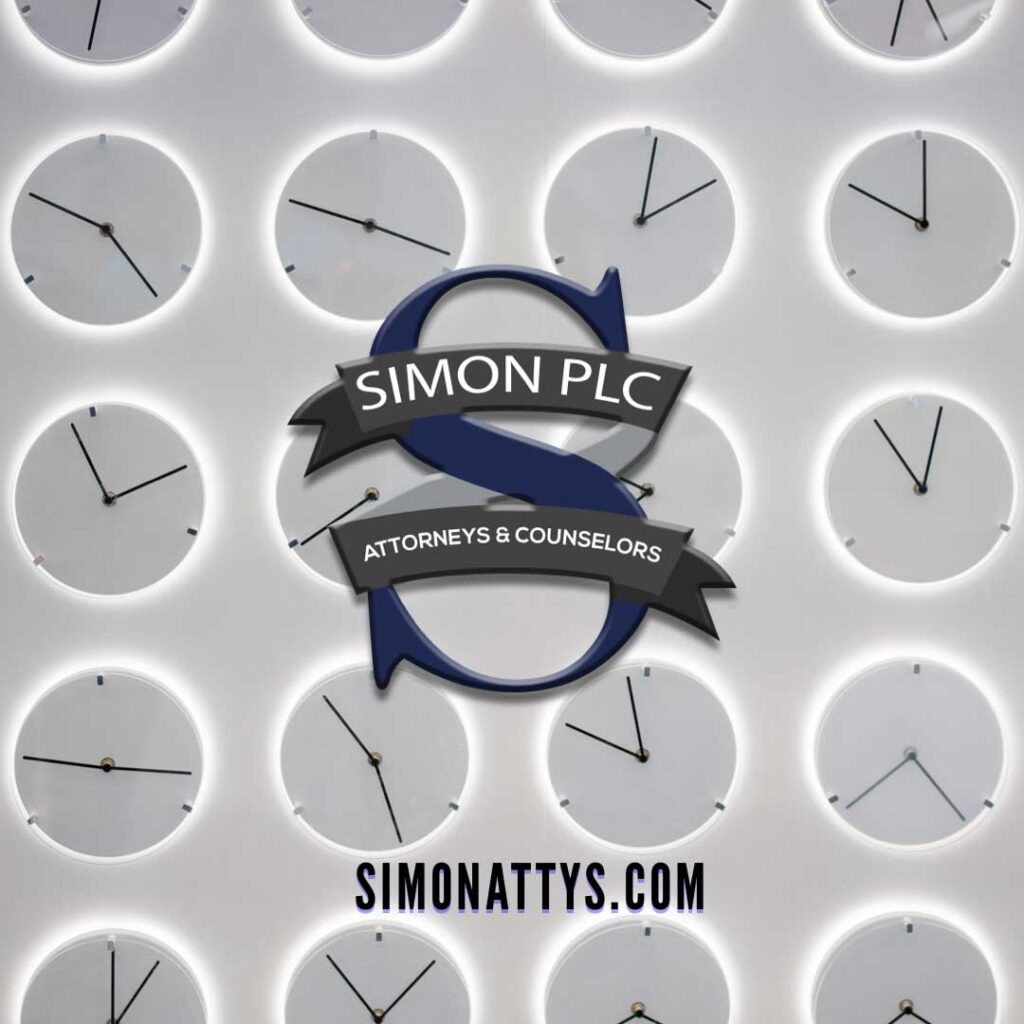Simon PLC Attorneys & Counselors – December 2023 Memorandum
Michigan’s Contract Statute of Limitations – Last Payment Date or Maturity Date – What Determines When a Debt Becomes Stale?
Troy, MI. In the recent opinion of Cadlerock Joint Venture, LP, v Buterakous (Unpbl., October 12, 2023 No. 363078) the Michigan Court of Appeals clarifies that where a note specifies it is payable in full upon a specified maturity date and was not previously accelerated, the statute of limitations begins to run after that date regardless of when any previous payments were or were not made.
In April 2003, defendant and her then-husband signed a note (the Note) securing a $46,000 loan secured by a mortgage on the couple’s marital home. Under the terms of the Note, defendant and her then-husband were required to make monthly payments beginning in May 2003. Significantly, the Note also states that the borrower will pay any amounts still due and owing as of April 28, 2018 in full on that date. Plaintiff filed the complaint giving rise to this action on February 24, 2021. In its complaint, plaintiff, a debt buyer, claimed that it was the rightful owner and holder of the Note [an unraised standing issue was reserved for determination on remand] and alleged that defendant had defaulted on the Note and therefore owed plaintiff over $80,000 in remaining principal and accrued interest.
According to defendant, she divorced her then-husband in 2004, no payment was made on the Note after 2006, the residential real property securing the Note was sold at a sheriff’s sale in 2007, and she was unaware that there was any liability still owing on the Note following the sheriff’s sale until she was served with the lawsuit. Defendant filed an answer in which she admitted entering into the Note but disputed the amount due and alleged a number of affirmative defenses, including that plaintiff’s claim was barred by the statute of limitations.
Following oral argument on cross-motions for summary disposition, the trial court ruled in favor of the defendant, finding that the plaintiff’s claim was barred by the general statute of limitations found in MCL 440.3118(1) which bars actions to collect a debt 6 years after the maturity date stated in the note or 6 years after acceleration and demand for payment in full. The trial court also found no demand for payment had been made since the defendant’s last payment in 2006 thus the action was also time-barred by MCL 440.3318(2) which prohibits suit where neither principal nor interest on the note has been paid for a continuous period of 10 years without demand having previously been made. The plaintiff filed a timely appeal of the trial court’s ruling that its claim was barred by the statute of limitations as well as an award of defendant’s attorney fees as a sanction.
Central to the analysis of the Appeals Court, the terms “payable on demand” and “payable at a definite time” are defined in MCL 440.3108, which provide, in pertinent part that a promise or order is “payable on demand” if it states that it is payable on demand or at sight, or otherwise indicates that it is payable at the will of the holder and does not state any time of payment. A promise or order is “payable at a definite time” if it is payable on elapse of a definite period of time after sight or acceptance or at a fixed date or dates or at a time or times readily ascertainable, subject to certain rights such as prepayment, acceleration or extension.
The Court of Appeals reversed and remanded, finding the Note at issue was “payable at a definite time,” not “payable on demand.” The Note does not say anywhere that it is “payable on demand or at sight,” nor does it otherwise indicate that “it is payable at the will of the holder.” Rather, the Note states that it was to be paid in monthly installments, and “[i]f, on April 28, 2018, [the borrower] still owe[s] amounts under this Note, [the borrower] will pay all those amounts, in full, on that date.” This makes clear that the Note is payable “at a fixed date . . . readily ascertainable at the time the” note was issued.
In overruling the trial court, the Appeals Court held that because the Note is payable at a definite time [and had not been previously accelerated] as defined in MCL 440.3108(2), the statute of limitations applicable to this action to collect on the Note is MCL 440.3118(1) which provides that “an action to enforce the obligation of a party to pay a note payable at a definite time must be commenced within 6 years after the due date or dates stated in the note or, if a due date is accelerated, within 6 years after the accelerated due date.” Having been commenced in February 2021, within 6 years of the Note’s stated April 28, 2018 maturity date, plaintiff’s suit was timely. The trial court erred by applying the incorrect statute of limitations found in MCL 440.3118(2) which expressly applies to notes not payable at a definite time or payable on demand.
When the statute of limitations has elapsed or whether or not a debt remains legally viable can be a more complex determination than may appear at first blush. What may have appeared on the surface to be a patently stale claim was, in the end, revived by the Court of Appeals. We at Simon PLC Attorneys and Counselors have a full understanding of the intricacies of Michigan statutes as pertains to statutes of limitations and other aspects concerning debt collection and are standing by ready to advise you as to the suitability of your debt for collection through the judicial system.
N.B. Not Legal Advice: Please contact us if you would like to discuss the facts and circumstances of your specific matter. Simon PLC Attorneys & Counselors expressly disclaims all liability in respect to actions taken or not taken based on any or all the contents of this memorandum. The information contained herein may not reflect current legal developments and is provided without any knowledge as to the recipient’s location, industry, identity or specific circumstances. No recipients of this content, clients or otherwise, should act, or refrain from acting, on the basis of any content included in this memorandum without seeking the appropriate legal or other professional advice on the particular facts and circumstances at issue from an attorney licensed in the jurisdiction for which the recipient’s legal issue(s) involve. The application and impact of relevant laws varies from jurisdiction to jurisdiction, and our attorneys do not seek to practice law in states, territories and foreign countries where they are not properly authorized to do so.

